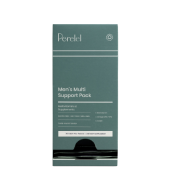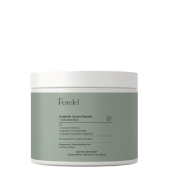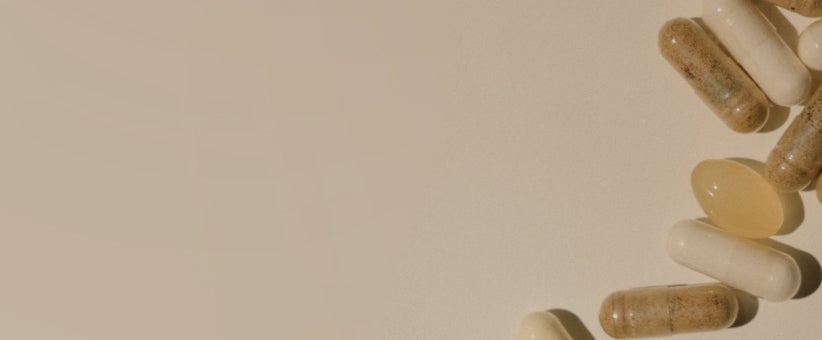Supplements can fill in nutritional gaps in your diet, prevent deficiencies, and boost overall health. So once you find a supplement routine that works for you, it may seem like a no-brainer to simply stay the course—if it isn’t broken, don’t fix it, right?
But here's the thing: Women's bodies aren't one-size-fits-all. In fact, our hormones and nutritional needs are dynamic and ever-changing. And that means that once you hit your 40s, it’s important to reevaluate your supplement strategy.
Your body goes through significant changes in your 40s, especially as you start perimenopause. Hormone levels fluctuate, and muscle mass and bone density may decrease. You’re also at an increased risk for heart disease, diabetes, stroke, and certain types of cancer, so it’s important to step up your supplement game to protect your health down the road. Here are 13 vitamins, minerals, and nutrients that should be part of your supplement regimen after you turn 40.
Shop the Article:
1. Omega-3s
These powerhouse fatty acids deserve a spot your supplement regimen after 40 thanks to the protective role they play against certain risk factors.
Omega-3 fatty acids can reduce triglycerides, slow the buildup of plaque, and lower your risk of developing a heart arrhythmia.12 Omega-3s also help to boost blood flow to the brain, and adequate intake has been linked to better performance on cognitive tests that measure memory, attention, and problem-solving. Omega-3s may also help to relieve inflammation in people with certain types of arthritis. Two omega-3 fatty acids in particular, DHA and EPA, seem to be instrumental in providing these benefits—so be sure to choose a supplement that includes both.
2. Calcium
This mineral is crucial for maintaining bone health and protecting against osteoporosis as we age. During perimenopause, declining estrogen levels lead to loss of bone density. This increases the risk of developing osteoporosis, a condition that causes the bones to become thinner, weaker, and easier to fracture.1 By age 50, nearly 1 in 5 women have osteoporosis in their lumbar spine.2 To support bone health, the recommended dietary allowance (RDA) of calcium is 1,000mg per day, which increases to 1,200mg per day after age 50.
3. Vitamin D
When it comes to bone health, vitamin D and calcium go hand in hand. Typically, we absorb around 30 to 40 percent of dietary calcium—but when vitamin D levels are low, we only absorb around 10 to 15 percent.3 Vitamin D also helps to modulate immune response, which may help to protect against inflammation and certain autoimmune diseases.4 Women under 70 should aim to get 15mcg of vitamin D per day.5
4. Magnesium
As you navigate perimenopause, the electrolyte magnesium can help make symptoms a bit more bearable. Research suggests magnesium may help to reduce hot flashes6 and stave off sleep issues7. It also plays a key role in nerve transmission, which can benefit brain function and help keep your mood in check.8
Magnesium also helps to activate vitamin D, so it’s important part of the equation when it comes to maintaining bone density as you age. And magnesium deficiency has been linked to heart arrhythmias and an increased risk for type 2 diabetes, so a supplement may help to lessen some of these age-related risks.9
5. Vitamin B12
Vitamin B12 plays a key role in keeping blood and nerve cells healthy. Research suggests it may also benefit brain health and improve cognition. A B12 deficiency is more common in patients with Alzheimer’s disease, suggesting this vitamin may have a protective effect against memory loss—although more concrete evidence is needed.10
This water-soluble vitamin is absorbed into the body with the help of stomach acid. But stomach acid production declines with age, which can slow its absorption. Because of this, it’s estimated that up to 43 percent of adults may have a vitamin B12 deficiency. Women should aim for 2.4mcg per day through food or supplements.11
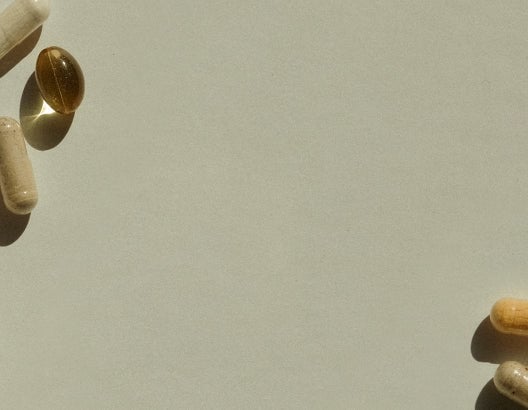

What are your
stage-specific needs?
Let us personalize your vitamin routine in 60-seconds.
6. Potassium
For women under 40, the risk of high blood pressure is around 22 percent. However, that risk jumps to 54 percent between the ages of 40 and 59.13 That’s why potassium is a crucial supplement after you turn 40—the American Heart Association says this electrolyte can help maintain healthy blood pressure.14 Potassium also helps to keep your nerves, muscles, and kidneys functioning properly. Women should aim for 2,600mg per day.
7. Rhubarb Root Extract
This plant extract, a staple in traditional Chinese medicine, may help ease the transition to menopause. In a study of perimenopausal women, those who supplemented daily with rhubarb root extract reported a higher quality of life, along with less frequent and less severe hot flashes, than those who took a placebo.15 Another study found that rhubarb root extract offered “pronounced improvements” in mental health during perimenopause by helping to lessen irritability, sleep issues, and exhaustion.16
8. Ashwagandha
Hormonal changes during perimenopause can mess with your mental well-being, but this Ayurvedic herb can help you maintain emotional balance. Research suggests ashwagandha may help to lower levels of the stress hormone cortisol, which can help to relieve stress and lessen feeling of anxiety. Research also suggests ashwagandha may significantly improve sleep quality, which can have a profound ripple effect on your mood, stress level, and overall health. (We include a clinically-studied form of Ashwagandha—alongside DIM and Rhubarb Root Extract—in our Peri Support Pack for this reason.)17
9. DIM
3,3′-Diindolylmethane, or DIM, is a compound that's been linked with healthy estrogen metabolism—and interestingly enough, it's found in cruciferous vegetables like broccoli, Brussels sprouts, and kale. Because studies have linked DIM with the ability to balance the ratio of "good" estrogen to "bad" estrogen, it may help support relief of common perimenopause symptoms.
10. Berberine
Berberine is a naturally occurring ingredient derived from the roots of the Berberis aristata plant, known for its role supporting healthy blood glucose regulation. Because hormonal changes during perimenopause can cause blood glucose levels to fluctuate, berberine can be a useful ingredient in helping to mitigate some uncomfortable symptoms during this life stage.
11. Antioxidants
Because the role of antioxidants is quite literally to prevent cell damage, it's wise to prioritize a diet and supplement routine that's rich in this type of molecule at any age—but particularly after the age of 40. Case in point: Our doctors opted to include L-Carnitine L-Tartrate and Green Tea Extract in our Peri Support Pack due to their antioxidant and polyphenol content, which may help the body’s inflammatory response and support metabolic health.
12. Fenugreek
This herb may be helpful for balancing hormones, which can help to ease some perimenopause symptoms. Research suggests women between ages 40 and 65 who supplemented with fenugreek experienced fewer hot flashes and night sweats. Fenugreek may also help to improve common perimenopause symptoms like low sex drive and irritability. (FWIW, this is why we include fenugreek in our Libido Support.)18
13. Fiber
There’s a reason fiber is considered a superfood. Not only is it an important part of a hormone-balancing diet, but it’s also well-known for supporting heart health and digestion, helping with weight management, and lowering the risk for type 2 diabetes.19
Fiber can also give your mental health a boost during perimenopause — a study of more than 5,000 women found that fiber intake was associated with a lower risk of depression in pre-menopausal women.20 In fact, one review of studies suggests that boosting fiber intake by just 5 grams per day could lower the risk of depression by 5 percent.21 Women are 40 percent more likely to experience depression during perimenopause, so make sure to include this nutrient in your supplement regimen after you turn 40.
Next up: Everything you've ever wanted to know about perimenopause.
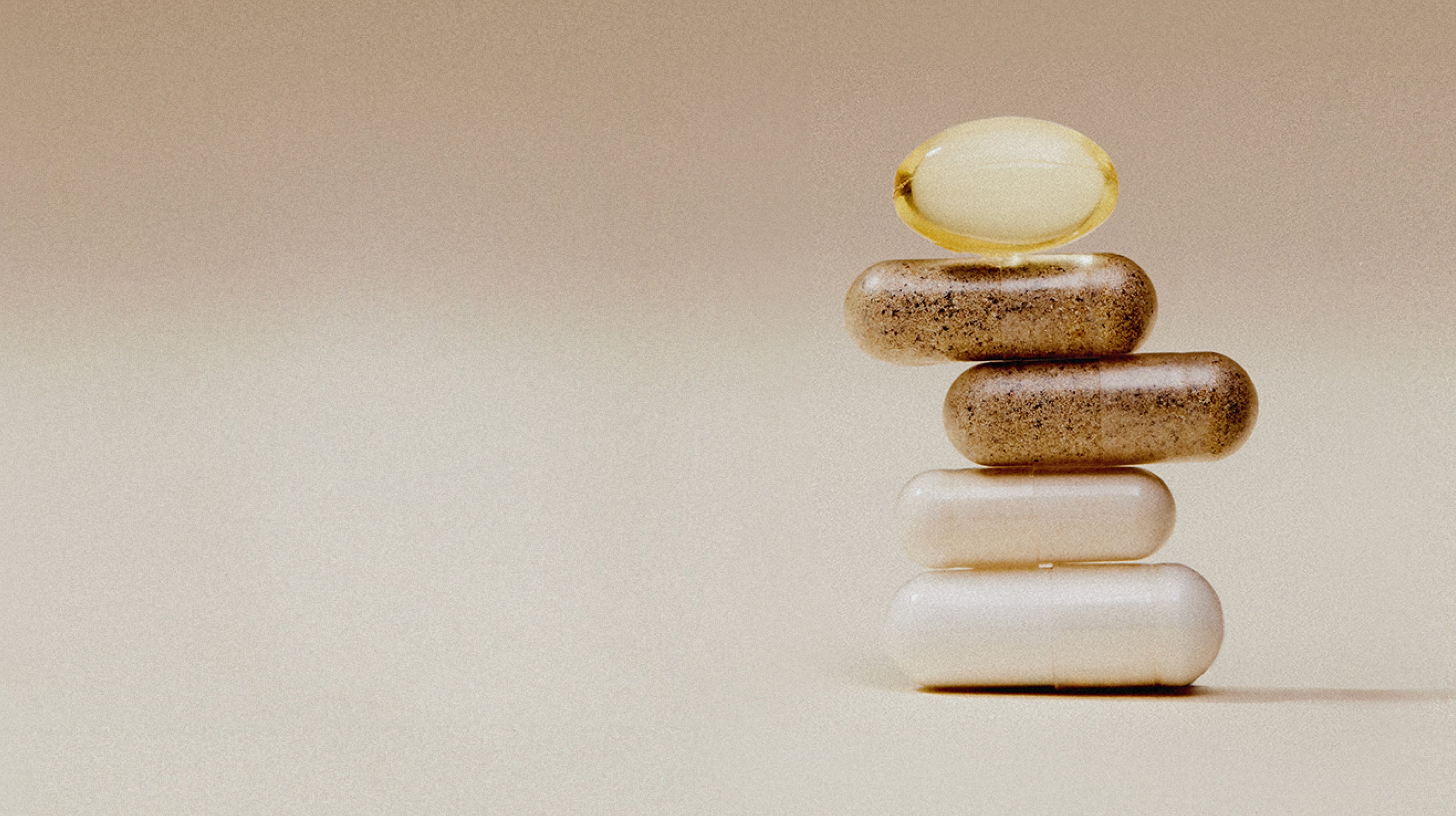
theFolio in Your Inbox
Sign up to receive doctor-backed, stage-specific content in your inbox each week.
References:
2. Osteoporosis Data, National Center for Health Statistics
3. Calcium and Vitamin D: Skeletal and Extraskeletal Health, NIH
4. Vitamin D: Effect on Haematopoiesis and Immune System and Clinical Applications, NIH
8. The Role and the Effect of Magnesium in Mental Disorders: A Systematic Review
10. Mechanistic Link between Vitamin B12 and Alzheimer’s Disease
11. Vitamin B12 Fact Sheet, NIH
13. Hypertension Prevalence Among Adults Aged 18 and Over: United States, 2017–2018
14. How Potassium Can Help Control High Blood Pressure
17. Ashwagandha: Is it helpful for stress, anxiety, or sleep?
19. Dietary Fiber: Essential for a Healthy Diet
20. Inverse association between dietary fiber intake and depression in premenopausal women
This article is for informational purposes only. It is not, nor is it intended to be, a substitute for professional medical advice, diagnosis, or treatment and we recommend that you always consult with your healthcare provider. To the extent that this article features the advice of physicians or medical practitioners, the views expressed are the views of the cited expert and do not necessarily represent the views of Perelel.






















